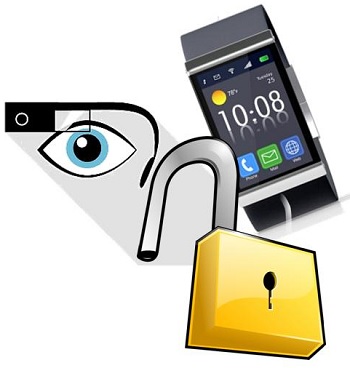A new report by ABI Research has revealed that wearables are rapidly increasingly in popularity.
The wearable technology market is moving quite quickly throughout 2014, but despite its popularity, the use of these devices could be placing consumers at an ever rising risk of a mobile security breach.
An ABI Research report claims that there will be 485 million shipments of wearables by 2018.
Among the most popular devices in the wearables category includes those that allow for the tracking of health and fitness data. They also often allow this data to be shared with friends, coworkers, or between doctors and patients. However, each new activity that is logged may also be opening up the user to a new mobile security breach risk.
This mobile security speculation by many in the wearables industry has been underscored by Symantec research results.
 On June 7, 2014, that company’s Security Response team looked at the most popular mobile apps at the Apple App Store and examined the most popular iOS compatible offerings within the free “health & fitness” category. It then tested the 100 most popular options within that category. Among them, there were 57 that were also available in the Google Play store so that Android device users would be able to them. Those 57 were also researched on the Android side, by the Symantec team.
On June 7, 2014, that company’s Security Response team looked at the most popular mobile apps at the Apple App Store and examined the most popular iOS compatible offerings within the free “health & fitness” category. It then tested the 100 most popular options within that category. Among them, there were 57 that were also available in the Google Play store so that Android device users would be able to them. Those 57 were also researched on the Android side, by the Symantec team.
What the Security Response team found was that 20 percent of the apps that they examined required a user to use non encrypted (clear) text which exposed their login credentials. This means that in the case of the users of those popular free applications, it could be possible for the device or the app to be compromised.
Furthermore, depending on when and where the wearable device is synced, it could mean that those login credentials will be shared with just about anyone who is paying attention. The typical wearable technology does not connect directly to the internet. Instead, it uses Bluetooth synchronization to an internet enabled smartphone, tablet, or desktop. This process may be making it much easier for cybercriminals to breach mobile security and scoop up personal data from the device user, without ever making him or her aware that it had occurred.
Adoption of wearable technology is slow going due to consumer security concerns.
A recent study from Acquity Group and Accenture Interactive found that while over 69% of American adults intend to own an in-home IoT (Internet of Things) device by the year 2019, only 13 percent are likely to own one by the end of next year, and the primary reason that adoption rate is so low is Americans are worried about their privacy when it comes to using wearable tech devices.
The study also found that only 9% of consumers would share free data with brands.
The percentage of consumers who would share data for free increased when they were offered a discount or coupon in exchange for their information, however. According to the 2014 State of the Internet of Things Study, of the 80% of consumers who were concerned about privacy, half of them stated they would be willing to share personal info that was collected by IoT devices with third-party retailers if they were compensated in some way for providing this data.
The president of Acquity Group, Jay Dettling said that “Our data reveals a gap in consumers’ fears of data privacy and their actual purchasing behavior.” He added that “To capitalize on these opportunities, companies should focus on specific benefits that sharing data will deliver to consumers.”
 In addition to sharing with retailers, the research learned that 53% of consumers are willing to share their personal information with doctors. Furthermore, 27% said they would share with family and 17% would share with friends. Fewer than 40% of consumer said they would not share their personal data with anyone.
In addition to sharing with retailers, the research learned that 53% of consumers are willing to share their personal information with doctors. Furthermore, 27% said they would share with family and 17% would share with friends. Fewer than 40% of consumer said they would not share their personal data with anyone.
Location based coupons are the feature most consumers look for from wearable tech IoT devices.
This is particularly true when it comes to coupons or offers for recipes or for goods that the consumer frequently purchases. Moreover, one third of those who participated in the survey said that to receive extra deals or coupons, they would watch heavily targeted commercials at home.
Dettling commented that it is “important for businesses to understand ways to overcome barriers to adoption and create digital device strategies.” He added that their study reveals just how important a “value-added” user experience is and that Brands that don’t evolve their techniques to match customer expectations will miss out on key revenue opportunities in the future. Companies need to assure consumers that their wearable tech devices and personal data are protected.
 On June 7, 2014, that company’s Security Response team looked at the most popular mobile apps at the Apple App Store and examined the most popular iOS compatible offerings within the free “health & fitness” category. It then tested the 100 most popular options within that category. Among them, there were 57 that were also available in the Google Play store so that Android device users would be able to them. Those 57 were also researched on the Android side, by the Symantec team.
On June 7, 2014, that company’s Security Response team looked at the most popular mobile apps at the Apple App Store and examined the most popular iOS compatible offerings within the free “health & fitness” category. It then tested the 100 most popular options within that category. Among them, there were 57 that were also available in the Google Play store so that Android device users would be able to them. Those 57 were also researched on the Android side, by the Symantec team.
 In addition to sharing with retailers, the research learned that 53% of consumers are willing to share their personal information with doctors. Furthermore, 27% said they would share with family and 17% would share with friends. Fewer than 40% of consumer said they would not share their personal data with anyone.
In addition to sharing with retailers, the research learned that 53% of consumers are willing to share their personal information with doctors. Furthermore, 27% said they would share with family and 17% would share with friends. Fewer than 40% of consumer said they would not share their personal data with anyone.